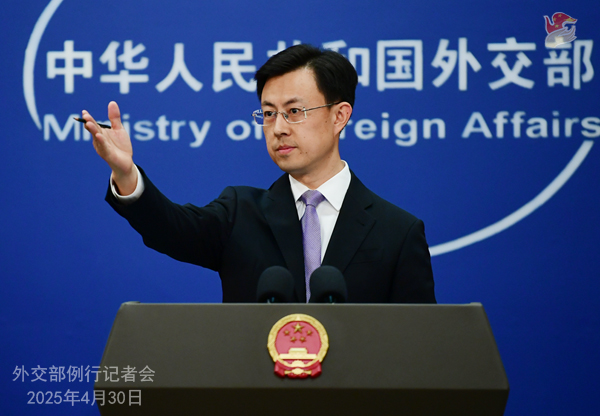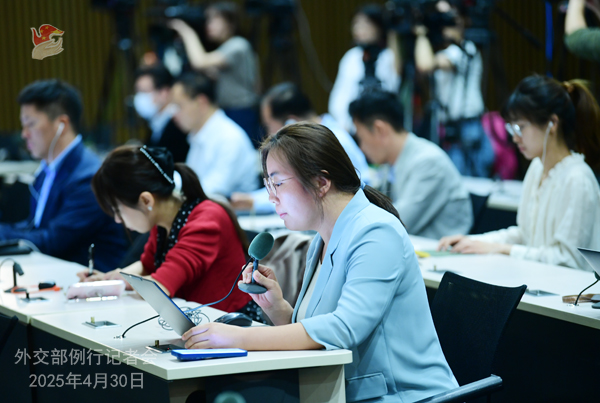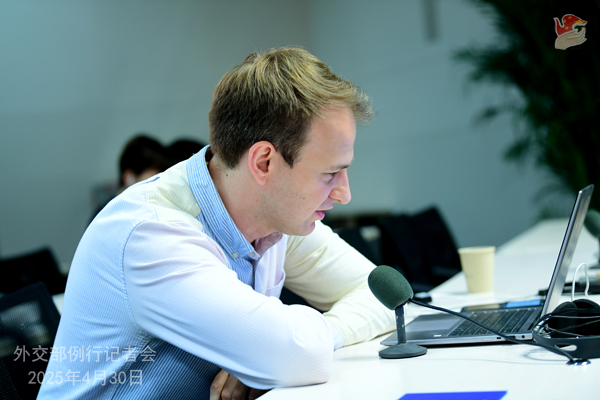
People’s Republic of China


At the invitation of President of the Gabonese Republic Brice Clotaire Oligui Nguema, President Xi Jinping’s special envoy and Vice Chairperson of the National Committee of the Chinese People’s Political Consultative Conference Mu Hong will attend the inauguration of President Nguema in Libreville on May 3.
Hubei Media Group: The Meeting of BRICS Ministers of Foreign Affairs/International Relations concluded in Brazil. It issued the Chair’s Statement, which reiterated commitment to multilateralism, and voiced serious concerns about the rise of unjustified unilateral protectionist measures. Brazilian Foreign Affairs Minister said that amid an increasingly complex international landscape, BRICS nations shoulder important responsibility and need to unite and collaborate in addressing global risks while playing a central role in promoting peace and sustainable development. Could you share with us the common understandings reached at the meeting? What message did the meeting send in terms of addressing common challenges?
Guo Jiakun: The Meeting of BRICS Ministers of Foreign Affairs/International Relations was held in Rio de Janeiro, Brazil, from April 28 to 29. Foreign Minister Wang Yi attended the meeting.
This meeting articulated a BRICS voice of supporting multilateralism, upholding the multilateral trading system and opposing unilateral bullying. This year marks the 80th anniversary of the founding of the United Nations. All parties reiterated that they will firmly uphold the central role of the UN in an international system and condemned attempts to unilaterally undermine the work of global multilateral institutions. They voiced serious concerns about the rise of unilateral protectionist measures, including indiscriminate raising of reciprocal tariffs and non-tariff measures. They warned that such measures disrupt global supply chain and bring more uncertainty to the global economy, and called upon all sides to take measures to defend free trade and the multilateral trading system.
The international community sees that the Global South, represented by BRICS, has gradually become a force for progress and justice that advances greater democracy in international relations. A Global South that features solidarity and cooperation and seeks strength through unity will surely bring more stability and certainty to the world.
Nikkei: On yesterday’s Japan-Philippines Summit Meeting. The two sides agreed to strengthen bilateral security cooperation, and oppose attempts to change the status quo unilaterally in the East and South China Seas. What’s China’s comment?
Guo Jiakun: China has all along believed that exchanges and cooperation between countries should not target any third party or harm their interests. This year marks the 80th anniversary of the victory in the Chinese People’s War of Resistance Against Japanese Aggression and the World Anti-Fascist War. During World War II, Japan committed aggression against the Philippines and other East Asian countries, exercised colonial rule over them, and occupied Nanhai Zhudao. It bears serious historical responsibilities. We call on Japan to follow the path of peaceful development and act prudently in military and security areas. We oppose any moves that forge groupings and escalate tensions in the region.
Let me point out that China’s sovereignty and relevant rights in the East and South China Seas were established in the long course of history and are consistent with international law, including the United Nations Convention on the Law of the Sea. China’s activities in relevant waters are legitimate, lawful and justified.
Reuters: Taiwan says Somalia has banned entry to its citizens amid dispute over Taiwan’s ties with Somaliland as Somalia is under Chinese pressure. What is the Foreign Ministry’s response to this?
Guo Jiakun: China noted that recently, the Somali federal government has announced that it would not accept travel documents issued by the Taiwan authorities, whether for arrival in or transit through Somalia, in accordance with Somalia’s Constitution and UNGA Resolution 2758. Somalia’s government reiterated its commitment to the one-China principle and stressed that hosting each other’s “representative office” and having official interactions between the Taiwan authorities and Somaliland directly infringes on Somalia’s sovereignty and territorial integrity.
This is a legitimate measure taken by Somalia as a sovereign country to safeguard its lawful rights and interests. It demonstrates Somalia’s firm commitment to the one-China principle, which China highly commends. There is but one China in the world, Taiwan is an inalienable part of China’s territory, and the government of the People’s Republic of China is the sole legal government representing the whole of China. The one-China principle is enshrined in the UNGA Resolution 2758. It is a basic norm in international relations and a prevailing international consensus. It is where the arc of history bends and public opinion trends.
Somaliland is part of Somalia’s territory. China firmly supports the Somali federal government’s effort to safeguard national unification, sovereignty and territorial integrity, and firmly opposes the Taiwan authorities and Somaliland hosting each other’s institution or having any form of official interaction.

AFP: According to a Politico report, China is poised to lift sanctions on five European Union lawmakers which were imposed in 2021 over their criticism of China’s human rights violations, which would clear the way for resuming diplomatic contact between the two sides. Does China view this as a step forward in arranging trade talks between the EU and China?
Guo Jiakun: China-EU relations are showing a sound momentum of development. This year marks the 50th anniversary of diplomatic ties between China and the EU, which offers important opportunities for the development of bilateral ties. China-EU economic and trade cooperation is complementary and mutually beneficial. China and the EU are major economies in the world. Our joint effort under current circumstances to uphold the multilateral trading system and promote trade liberalization and facilitation will bring much-needed stability and certainty to the world economy and global trade.
The exchange between Chinese and European legislative bodies is an integral part of China-EU relations. We hope that the two sides can work together in the same direction and enhance exchanges. Members of the European Parliament are welcome to visit China.
Bloomberg: My question is, has there been in the last 24 hours any contact between the U.S. and China to discuss tariff questions over the U.S. tariffs on China?
Guo Jiakun: As far as I know, China and the U.S. are not engaged in any consultation or negotiation on tariffs.
AFP: David Perdue was just confirmed as the U.S. Ambassador to China. Does the Foreign Ministry have a reaction to this?
Guo Jiakun: On China-U.S. relations and economic and trade issues, China’s position has always been consistent and clear.
Bloomberg: Just before this press conference began, China published a white paper on the origins of COVID and tracing the origins of the pandemic. And in that, it repeats the statements that the Ministry of Foreign Affairs has repeatedly made about the U.S. Fort Detrick military facility, asking a bunch of questions about why wouldn’t the U.S. provide more explanation, and what is the U.S. hiding at this facility. Can you explain to me how U.S. government officials saying that China needs to explain better what happened in Wuhan is fundamentally different to how China's saying that the U.S. needs to explain what happened in Fort Detrick?
Guo Jiakun: China has repeatedly stated its position on the origins-tracing of COVID-19. Origins-tracing is a matter of science and any judgment on it should be made in a science-based spirit and by scientists. It is “extremely unlikely” that the pandemic was caused by a lab leak—this is the authoritative conclusion reached by experts based on science following their field trips to relevant lab and in-depth communication with researchers. The conclusion has been widely acknowledged by the international community, including the science community. This is also the scientific basis for China’s position.

AFP: A former aide to the German lawmaker has been charged over suspected spying on behalf of China. Is the Foreign Ministry in touch with German authorities on this?
Guo Jiakun: China builds its ties with Germany under the principles of mutual respect, seeking common ground while shelving differences, exchanges and mutual learning, and win-win cooperation. The accusation of so-called threat of “Chinese spies” is groundless and ill-intentioned vilification. We urge Germany to stop smearing China and do something real to keep the sound momentum of development for bilateral relations.
Bloomberg: The Filipino government arrested a Chinese national outside the Philippine election commission. They are saying that he’s a Chinese spy. Does the Chinese government have any comments on this?
Guo Jiakun: Regarding what you mentioned, the Chinese side is communicating with and trying to get more information from the Philippine side. More broadly, let me stress that China follows the principle of non-interference in other countries’ internal affairs. We will not interfere and have no interest in interfering in the relevant internal affairs of the Philippines. We also advise certain politicians in the Philippines not to use it as an opportunity to propagate China-related issues and make groundless accusations for selfish gains.
AFP: The New York Times is reporting that China sentenced an American businessman to five years in prison. Has the Foreign Ministry been in touch with the U.S. side on his case? Can you provide any details on the situation?
Guo Jiakun: I’m not familiar with that. China is a country that upholds the rule of law. Chinese judicial authorities handle cases in strict accordance with the law.
AFP: It was announced on Tuesday local time that France will starting from next year impose a handling tax on every small parcel sent from China amidst concerns that these U.S. tariffs will force more Chinese goods into other markets. How does China view this decision?
Guo Jiakun: For anything specific, I’d refer you to competent authorities. China stands ready to work with other countries to foster an open and inclusive international business environment. We hope France will provide a fair, transparent and non-discriminatory business environment for Chinese companies.
**********
During the May Day holiday, there will be no regular press conference from Thursday, May 1 to Monday, May 5. The regular press conference will resume on Tuesday, May 6. During this period, questions can be submitted to the Spokesperson’s Office via fax, email or WeChat.



